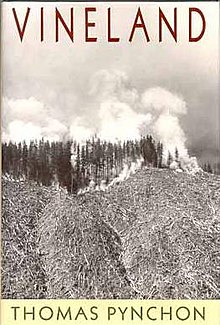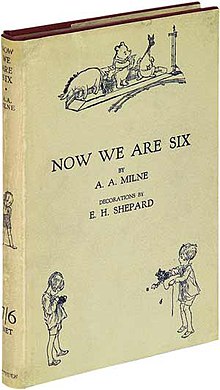Advertisement
If you have a new account but are having problems posting or verifying your account, please email us on hello@boards.ie for help. Thanks :)
Hello all! Please ensure that you are posting a new thread or question in the appropriate forum. The Feedback forum is overwhelmed with questions that are having to be moved elsewhere. If you need help to verify your account contact hello@boards.ie
Hi all,
Vanilla are planning an update to the site on April 24th (next Wednesday). It is a major PHP8 update which is expected to boost performance across the site. The site will be down from 7pm and it is expected to take about an hour to complete. We appreciate your patience during the update.
Thanks all.
Vanilla are planning an update to the site on April 24th (next Wednesday). It is a major PHP8 update which is expected to boost performance across the site. The site will be down from 7pm and it is expected to take about an hour to complete. We appreciate your patience during the update.
Thanks all.
League of Extraordinary Books
Options
Comments
-
New Items:
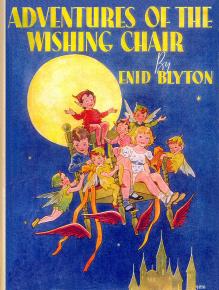
Adventures of the Wishing-Chair by Enid Blyton (1937)
Do you want distinct characters, rich descriptive writing, emotional involvement and that mix of the fantastic and grounded that makes a story feel truly magical? Then you should look elsewhere because this book has NONE of that :P .
This is Blytons knockoff of E.Nesbits, 'Five Children and It' or maybe the sequel the 'Phoenix and the Carpet'.
Blyton does here to children's fiction what Edgar Rice Burroughs does to adventure fiction. And NO, the fact that this is aimed at kids does not excuse the poorness of the writing.
Now its not without a certain excitement. Bad writers have two advantages over good ones. Firstly is speed, a bad writer can fit as much incident into a couple of pages as a good writer would in a couple of chapters.
Also good writers like good politicians tend to be hampered by logic and reason. A bad writer like a popular politician feels no need for there to be any rules and can throw whatever random nonsense they like into the plot.
Its true that some good books can feel almost as random, 'Mary Poppins' for example is at least as variable a this, however that randomness is offset by grounded moments that make the weird ones stand out through contrast.
Despite the very short chapters i rarely made it through one fully engaged. The flatness of the characters and mediocrity of the writing making it so hard to care. Literary beige.
The book version of a straight to dvd disney film. As mentally stimulating as an 'Adam Sandler' movie. Narrative horse-tranquilizer. Whenever you start to enjoy it you can actually feel a few more braincells commit hari-kari. Everytime someone praises this book a fairy dies...wait..wait.. i'm sure i've got a few more ...
...
ok i've just realised i'm putting way more effort into finding ways to insult this book than the author did in writing it, so i guess i'll stop :P . [2/5]
The Golliwogg in War by Florence K.Upton (1899)
Kind of messed up but everything works out ok in the end. Great drawings again and a good message overall. Given it's from 1899 i really wasn't sure how the story was going to go. Not exactly anti-war but not pro either.
And i like that the characters have different reactions to the situation. [4/5]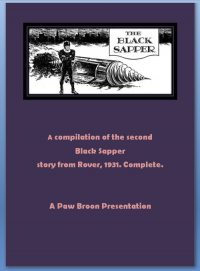
1 issue of the Black Sapper (1971)
Not an awful comic. Bit repetitive and racist, also not much jeopardy but decent enough. [3/5]
Film Item:
3 episodes of Supercar (1961)
Early thunderbirds proto-type. Good characterization, ok stories. [3/5]0 -
New Items:

King of the City by Michael Moorcock (2000)
A surfeit of pleasures.
A modern Dickens, which it doesn't try to hide, it even makes a direct reference to Bleak House . Wonderful descriptive writing, 5 or 6 big vivid set pieces that you'll never forget. The characters are hyper-real, like real people but just a bit more interesting than any real person has a right to be .
.
The narrator has his own unique voice, with his own slang etc. this can be a little disconcerting at the start but you soon get used to it.
In similar fashion to Mother London we start off in present day (circa 1997) then jump back in time and get a biography of events until we catch up with ourselves again in the last chapter. Unlike Mother London, there is only one point-of-view character and the time jumps are kept to a minimum, so in that regard its far easier to follow.
Nevertheless, i still got a little confused at times as to the year or mixed up among some of the side characters. It doesn't help that some of the cast have nicknames or are sometimes referred to by their first or last names.
Its a very England and London specific book so there were a lot of references i didn't get. Some of the political and social elements went over my head too. But none of that mattered in the end.
Like most Dickens novels there is a plot but nobody pays much attention to it. You could say its a commentary on the rise of consumer culture and the 1% but its really about the development of the various characters. And as for those characters, this time around (see below) our incestuous triumvirate are three cousins, our POV character who is an ex-Rock n'Roll star turned photojournalist, a hyper-intelligent Angelina Jolie-esque aid organizer and a man i can best describe as a combination of Gordon Gekko and Charles Foster-Kane.
It wasn't always perfect, there where peaks and troughs but overall a very easy 5 stars to give. An incredibly dense feeling book, 110% of story.
Sidebar: Ok this is so weird, Moorcock has now written the same story at least 3 times! First there was Elric of Melniboné , then Jerry Cornelius and now this. That's not to say the stories are similar, they're all incredibly different but its the difference between '10 things i hate about you' and the 'Taming of the Shrew', or perhaps a little further apart, like 'Sons of Anarchy' and 'Hamlet'.
With 'Jerry Cornelius' i dismissed the similarities as Moorcock just being short of an idea but by now it feels more deliberate. As if the author is working on some sort of Meta level, creating his own myth-cycle or something.
Anyway none of that actually matters, this is an entirely self-suffient book so i've reviewed it entirely on its own merits. [5/5]
Golliwogg in the African Jungle by Florence K.Upton (1909)
I thought this was going to have many more issues, i was expecting cannibals but apparently they appear in 'The Golliwoggs Bicycle Club' instead, which i havn't read yet.
Anyway, the africans in this arn't portrayed too badly, they look a bit like the ethiopians from South Park. The racial issues are mostly avoided in favour of big game hunting! But don't worry, things take a more peaceful turn before any animals are harmed.
Although in the background pictures i did spot one of the dutch dolls steal and fry up some ostrich eggs, which was quite funny, especially since its not referred to at all in the text.
Overall pretty decent, it seems to have more text than the earlier books. Nice drawings as usual. Obviously the african setting does nothing to downplay the problems inherent in the hero's appearance. Also he doesn't do anything really brave or intelligent in this like he does in some of the other works. Its mostly the dutch dolls to the rescue. [3/5]
10 issues of Viz comics (1979)
Yeah i can see the appeal, if i was a teenager this would be the greatest thing ever . [4/5] 0
. [4/5] 0 -
New Items:
The Monikins by James Fenimore Cooper (1835)
"That of all the 'oracies (aristocracy and democracy included) hypocrisy is the most flourishing"
A dry humoured socio-political satire involving a voyage to fantastic places. An american Gullivers Travels.
So much of this still applies to the world today, i don't know whether to be horrified that nothing has changed or comforted that we apparently survived it last time .
.
I do rather enjoy my Gulliver-esque type satires and this was no exception. I was genuinely close to giving it 5-stars despite all the reasons i should have dropped it to 3.
I've only read one other Fenimore book but i don't recall the language being this hard to parse. I think its a combination of Ye Olde english and all of the sarcasm in the story.
Sarcasm can be hard to absorb in the written form even for a modern writer, so 100 year old sarcasm.... thats a hard one. It actually took me a third of the book before i was sure it was a satire.
Also nothing fantastic happens in this first part but we still get some funny satire about how peoples opinions change depending on their social position or financial status.
Finally though the Monikins show up which are talking monkeys. Eventually leading to an exploration of the Leap islands, Leaphigh being a satire of england and Leaplow a satire of america.
Its an incredibly sarcastic book, then there's some really long legal and philosophical jokes, we have the satire and also some just genuine straight-up comedy.
For example there's an onrunning joke about the ships captain kicking the cabin boy in the ass, which Cooper gets surprising mileage out of.
Apart from the obtuseness of the language i also had problems knowing exactly what was being satirized. I could see the satire in the general sense but there were a lot of elements i felt were direct references to things i couldn't understand.
For example in Leaphigh (england) the monarch has no power, this being taken by their first male cousin. The first male cousin must be the primeminister but i don't know why its referred too in this manner.
There was a LOT of times like that, where i felt i was missing some historical context.
Also of note when we do get to Leaplow (america) towards the end, there is a lot of political satire. So if you don't know the american setup with its supreme-court, 3 branches of government, senate and congress etc. Then you may find it extra difficult.
Overall though, despite the obtuseness of the language, the loss of historical context, the elements of sexism and racism (which i'm sure wasn't all sarcastic), nevertheless i REALLY liked this one.
And the ending... oh boy, not the most original but there was a certain odd twistedness to it that added some extra punch . [4/5]
. [4/5]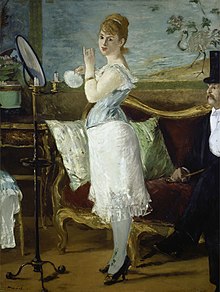
Nana by Emile Zola (1880)
Not a bad story for what it was. As a way of showing a certain type of culture and behaviour it works well but it doesn't really engage on an emotional level, despite being well written and richly described.
The only other Zola i've read is L'Assommoir (The Dram Shop), which featured Nana's mother as the main character and that was very engaging and harrowing.
Nana however doesn't have much of a character to empathize with, being shallow, uneducated, impulsive and self-destructive.
Ironically given the nature of the story the author uses her to fulfill whichever role he needs, much like the other characters do. Her personality changes somewhat with each chapter and said chapters are so self-contained it almost becomes a collection of short stories.
Nana's lack of and changing character, a large cast and the episodic nature of the tale all combine to keep events feeling remote to the reader.
Which on the one hand is a good thing because i don't need to be emotionally scarred again , but on the other hand still makes it less compelling.
, but on the other hand still makes it less compelling.
On a side-note the story reminded me strongly of the film Pandora's Box at times, which can't be a bad thing . [3/5]
. [3/5]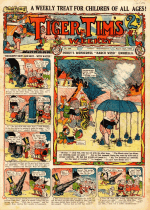
5 issues of Tiger Tim's Weekly (1928)
Mix of comic and prose. Some racial issues and pretty insipid but not bad. [3/5]0 -
New Items:

The Theory of the Four Movements by Charles Fourier (1808)
Well that was mostly terrible but not entirely so. I'll try to break this down.
We have about 5% cult-leader style self-promotion and praise, the author compares himself to Columbus and Hercules at various points.
About 10% wacky interpretive fiction, something along the lines of Phrenology or Astrology but he applies it to everything in his 7000 year old universe. From peacocks to the northern lights to the fact Earth doesn't have cool rings like Saturn (he seems particularly bitter about that :P ), in the authors view these are all symbols placed by a god to tell us we're doing things wrong.
Another 5% is fairly well aimed critique of civilization and capitalism, the critique is far longer than 5% of the book but only about 5% is not tedious.
So i think we're up to 25%, now, add 65% mind numbing tedium and we're left with a 10% golden nugget of wisdom.
The authors utopian ideas are not terrible, his attempt being to create a system in which peoples greed, jealousy, ambition, sexual passions etc. are beneficial rather than destructive. Using a short of rival club system combined with the usual commune idea.
However the real highlight is the authors views on slavery and especially the role of women in society. Frankly in some ways his views are more advanced than those of today. Although he doesn't go into too much detail, meaning his views on female equality may not entirely be the same as a modern view of female equality.
Nevertheless some really interesting stuff, like i say a lot of the time after reading an old book, nothing much seems to have changed , the authors critique of capitalism and gender equality still being annoyingly relevant.
, the authors critique of capitalism and gender equality still being annoyingly relevant.
Overall though still boring as hell . [2/5]
. [2/5]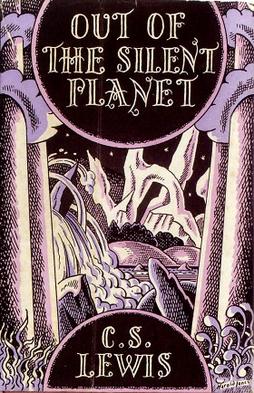
Out of the Silent Planet by C.S Lewis (1938)
So this is Lewis's knockoff and attack on H.G. Wells novel 'The First Men in the Moon'. Its also basically Narnia in space but with even less happening. A sort of dry utopian story with religious allegory. Not as bad or religious as some books like 'A Journey in Other Worlds'.
Most of the fun comes from comparing it to First Men in the Moon so i;m not sure how much those who havn't read that book will get. For example, 'First Men' has two protagonists, the scientist and the business man, this book portrays them both as monsters and adds a third character the religious philologist as our hero, wow subtle :P . It also does the rather pointless postscript which 'First Men' also used (although the latter doesn't call it a postscript but it certainly feels like one) .
I'm not sure what the main idea was that this book was trying to convey perhaps it was that the human race deserves to die out, or that people should stay where god put them, or that the universe is doomed anyway so why bother trying to stay alive, or that this life is a dud but there's an afterlife so we might aswell all kill ourselves, all of which seem pretty stupid ideas. On the other hand if the whole thing is an indictment of colonialism then it works quite well .
.
There is some good stuff here i especially like a view on how something you experience is built into you for the rest of your life, although that also seemed like a allegory Lewis could use to avoid having sex with his wife again .
.
Short and not badly written, although it certainly feels like it ripped off the writing style of Wells not just the plot, very 1890's rather than 1930's. [2/5]
Sexton Blake, the Case of Atwell Aircraft Company by Anthony Skene (1922)
Short detective/espionage story, featuring the villian Zenith the Albino. Reminded me somewhat of The Thirty-Nine Steps but better. [3/5]0 -
New Items:

A Legacy of Spies by John Le Carre (2017)
Context, this is the first Le Carre i've read, the espionage genre not being a favourite of mine. My only Le Carre experience is the last film adaptation of Tinker, Tailor and the Nightmanager mini-series.
While there are clearly at least a couple of other Le Carre stories being referenced in this i didn't find that offputting or detrimental to the book.
Overall its a well crafted and detailed plot with likable characters and while not much in the way of action its realistic and generally compelling.
I did however have a few issues with it that could have brought the rating down but i decided it was still worth the 4-stars in the end.
So the very general plot is that in modern day questions are being asked about an old operation called Windfall. So you have a lot of back and forth between the present and past.
First issue is that Windfall only actually starts about half or maybe two-thirds of the way through the novel. So when we finally get to that point it undercuts everything thats gone before, makes it feel a little pointless. I don't think it's a good narrative device to make the majority of your book feel like prologue. Don't get me wrong all of the previous stuff is great, its only when i realized that it was all preamble to the actual Windfall operation that it put a bad taste in my mouth.
My other minor issues are about the endings, there are of course two of them one for Windfall in the past and one for the present. In the present it feels a bit Deux Ex Machina and also some of the characterization of one of the final people to appear just felt... odd. Some of it was good but some not so good.
As for the climax of Windfall, what the entire book feels like its been leading up to... amazingly this is the one place the author decides to skimp on the details. All this build up and yes we get the general outline of what happened but far less information than i would have liked.
Perhaps the author felt he'd dropped enough hints throughout, that it would be insulting to the reader to do a blow-by-blow at the end but i certainly wanted a more indepth account.
As a whole though, undoubtedly well written, but didn't convert me to an espionage fan.
Edit: Having looked at some other reviews i now understand a lot of the details i was missing are from another Le Carre novel 'The Spy Who Came In from the Cold.' [4/5]
Travels and Adventures of William Bingfield by William Bingfield (1753)
The writing in this is pretty basic, functional at best so i was expecting to give it 2-stars but it has some redeeming qualities.
It starts off as a pretty basic castaway tale and hits all the usual tropes, ridiculous coincidences, cannibals, the happy black servant. Its also slightly racist, sexist, classist and religious but actually in a very mild manner for the time. ___
___
Its main bit of weirdness is the creature it mentions in the blurb, the Dog-Bird, which seems built like a cassowary but with the personality of a velociraptor (at least the film kind) and trainability of a german shepard. It should be noted the author gives up on this Deux Ex Macina after the first volume.
On to the good stuff though, its a remarkably... human story. People react and behave in ways that just seem very normal and awful in a human way, which seemed unusual compared to the more refined literature of the period.
During the latter parts of the first volume and most of the second it is more an african adventure story than a castaway tale. Like a combination of 'Robinson Crusoe' and the works of 'H. Rider Haggard' before becoming even more pulpy and something like 'Edgar Rice Burroughs'. Especially with out hero suddenly turning into a master tactician and warrior for no particular reason.
Finally though the main oddity of it all was the constant human horror of it. incident after incident of friendly people who suddenly become the enemy or bad human decisions to be made and every time new people turned up your like 'oh god.. here we go'. Its 'Walking Dead' :P it really is... just horror after horror, but not quite as affecting due to the flat writing style.
There's no reason anyone in the universe should be reading this but i wasn't bored while i did . [3/5]
. [3/5]
Supplement to the History of Robinson Crusoe by Thomas Spence (1782)
Short bit of utopianism set on fictional island founded by crusoe. Main idea being, all land owned by the state, interesting enough. [3/5]0 -
Advertisement
-
New Items:

Three John Silence Stories by Algernon Blackwood (1908)
I am a bit prejudiced against John Silence before i read this. Firstly i have read some story with him in it about a werewolf, wasn't a fan, also i already like some of his supernatural detective rivals so it was always going to be hard for him to break into an already crowded field. And he doesn't quite manage it.
I also noticed that for some reason each of the three tales uses a different perspective. The first story, has Silence himself as the point of view character, the second, has really no reason to be in this collection as its just random guy telling tale to people which include Dr.Silence and the last goes with the more common Watson-esque assistant as the P.O.V. character.
This is neither as delightfully weird as 'Carnacki, the Ghost Finder' or as pithy and likable as 'The Secrets of Dr. Taverner'.
While there were times in each of the stories it approached a 4-star the writing just kept going and they always felt more drawn out than necessary. In addition while the writing is quite descriptive it isn't as vivid as Lovecraft or similar authors.
'The air, soft and cool caressed his cheek like the touch of a great furry paw.'
These are very cat orientated stories , ironically the only one not be cat-centric was the one with an Egyptian connection, bit of a missed opportunity that
, ironically the only one not be cat-centric was the one with an Egyptian connection, bit of a missed opportunity that  .
.
One final note, Silence is described as this really great kind guy always out to help people blah, blah, but then i noticed this line
'By some means which I never could fathom, John Silence always contrived to keep the compartment to himself..'
Oh wow thats a great use of your mystical abilities, hogging the train carriage!, ass :lol . [3/5]
Jacques the Fatalist by Denis Diderot (1796)
'And your Jacques is only an insipid agglomeration of facts, some real, some imagined, written without grace and distributed about with no order.'
Philosophical comedy. Its almost stream-of-consciousness writing the author often breaking the fourth wall.
Most of it are these philosophical musings interrupted by various stories. The tales themselves are often broken up and interwoven, so at times even the characters telling them get confused as to where the stories left off.
Whenever i started to get bored there would be some funny moment or interesting idea thrown out. However i still might be rounding up to get to 3 stars. There were some genuinely funny parts, some of the conversations seemed like a Marx Bros sketch at times. [3/5]0 -
New Items:

The Hardy Boys, The Tower Treasure by Franklin W. Dixon (1927)
This was pretty decent, the cast where a little older than i expected, 17 and 18, i was thinking they would be early teens or kids like the Famous Five. The story was also a bit more realistic and how much the heroes were able to accomplish without help seemed believable.
It would have been nice if the female contribution was more than just baking but this is the 20's, i think the 20's and 50's are probably the most sexist of decades in terms of media, as the male-society reasserted its control after the relative female freedom caused by the war years, just a hypothesis.
There's a good bit of interest in the outcome of the case as it effects some of the characters in the story in a very sympathetic way. So there is tension but on the other hand no actual jeopardy. Its like a 60's batman episode where batman and robin have been captured and the narrator says 'Can the dynamic duo free themselves from...' and before he can finish imagine that they've already escaped. That's what happens here, any sign of possible physical jeopardy is so quickly dealt with it seems almost pointless that it was even mentioned, odd choice. There's a greater sense of danger in E.Nesbit books.
The detective elements were quite good and overall i liked it more than i expected too. [3/5]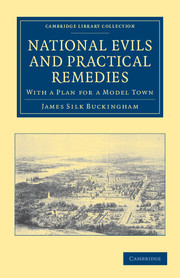
National Evils and Practical Remedies by James Silk Buckingham (1849)
So an interesting bit of utopian planning, although the author hates the word utopian. This is an actual plan nothing too outlandish. The main idea is a sort of corporation, each individual in the town gets a salary with plenty of room for promotion to a higher salary. Everything created by the townspeople is sold off, locals gets first dibs at a discount, and at the end of the year the workers get a dividend in addition to their basic wages.
It seems like a pretty good system, there's free healthcare, daycare, jobs for women, maximum working hours, minimum wage, cross training etc.
Also cheap restaurants which everyone is encouraged to use instead of eating at home and one store for each kind of produce, with all items being put into a catalogue 'Argus' style.
There are also some oddities like wanting all the buildings to be made of iron and a giant light on a tower in the middle of the town capable of illuminating the entire place.
In addition there is no alcohol, tobacco, drugs or firearms allowed in the town.
After the model town plan the rest of the work consists of historical precedents and other facts designed to backup the idea, also ALL of the accounts and inventory numbers needed to realise the plan.
Finally the author goes onto some other general topics like tax and voting reform which i mostly just skimmed. Although there was one part about colonies that caught my eye.
In which the author argues that all of Britains colonies would inevitably become independent and that this was not a problem unless they parted on bad terms. I guess nobody listened .
.
Of some interest but only as a historical curiosity. [2/5]0 -
New Items:

The History of the Sevarambians by Denis Vairasse (1675)
I was still undecided whether to give this 2 or 3 stars, but then near the end i hit the language section. With 20-30 pages of grammar lessons and thought nope 2 it is .
.
So this so is one of those descriptions of a utopia, there isn't much in the way of story, its just a frame for the details of the geography, politics, education, language, religion, history etc of this fictional place.
Its divided into 5 sections, the first is a description of the authors life and a shipwreck which strands 300 men and 72 women on some unknown island.
If your worried that the women arn't going to fair well in that kind of situation... you would be right.
So as to be classist aswell as sexist, the officers each take one and the rest are divided amongst the men about 5 women to each man... ugh.
But don't worry in section 2 they find a utopian society, who are shocked and appalled at the treatment of the women.
Because they're polygamists and feel multiple men to one women is very wrong, it should be mulitple women to one man. Again its also classist as the number of wives you can have is determined by your rank, there an employment bonus like a company car... ugh.
Until all the men can find wives they are given sex slaves instead which are apparently kept around for the use of travellers.
Don't worry though the men have to undergo a medical check for syphilis first, no i'm not kidding they actually did that, yay?
I could make this review really long but it would just be a recitation of everything in here. It is kind of fascinating because there are so many contradictions but overall its still pretty boring.
So i'll simply give a short list of the good and bad points of the supposed utopia on show here.
Good:
Equal education for men and women, semi-equality of employment, 8 hour workday, no poor, no capital punishment, equal male female army, semi-democratic elections, religious liberty, no hereditary jobs.
Bad:
Neighbouring tribes have to give tributes of children to be used as slaves, no private property, censorship, most female soldiers under 18, eugenics with anyone seen as physically or mentally damaged sent to one particular province, children taken and educated (indoctrinated) by the state from age 7, no females in positions of authority, blood sports, corporal punishment, spies sent to foreign lands but only if they have at least 3 children to be used as leverage for their return, all people must get married by 18 or 21 for women and men respectively, if a women can't find a man she must marry one of the high officials who has an open slot in his wife tally, the supreme leader gets first dibs on any pretty women. [2/5]
The Carpetbaggers by Harold Robbins (1961)
If i was to do a one word review it would be 'Inconsistent'. Inconsistent characters, tone, pacing, graphicness, length.. somehow.
This is basically a soap-opera drama, something along the lines of 'Dynasty' or 'Dallas'. It follows the interweaving lives of three main people, a cowboy, a woman based at least partially on jane russel and a howard hughes knockoff. Except then just as your expecting it to finish up it adds two more new characters... what? Who are these people, why is this still going? Its like it was meant to be two books but the author couldn't quite find enough material for the second so instead you have here a novel and a half.
Between the now 5 main characters are about 18 different personalities. There's never any attempt made to use the book medium to advantage. In books its easy to see what people are thinking and get inside their heads but that never happens here, your as removed from them are you would be watching it on tv.
Other oddities are that the book can be quite graphic when it comes to sex and violence, sometimes.. then other times it turns and runs from the sex or violence, again inconsistent.
There are a lot of side characters in this too some of which pay off and others that just disappear from the story suddenly and without a trace.
The various storylines interweave and the plot jumps back and forth in time and from location to location often without any lead in. Everytime you hit a paragraph end you wonder whether the next one will be in the same time or place (and usually isn't). In other novels this would be extremely confusing but somehow here its merely annoying.
Oh and heres a reverse spoiler, the howard hughes character does not end up storing his piss in jars, i kept waiting for that to happen but no, maybe in the sequel .
.
Having said all that, you can't deny its dramatic, if you like your soaps this has a lot of story to munch on and the writing is fine even if the structure is a mess. [3/5]0 -
New Items:
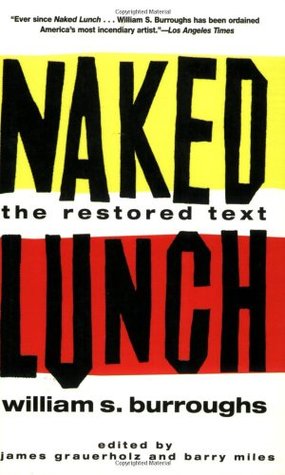
Naked Lunch by William S. Burroughs (1959)
I was genuinely afraid to read this book, so much so that for a time i had removed it from my to-do list completely. I still have scar tissue from the 'Story of O' (actually a pretty good story), '120 Days of Sodom' (aaaaaarrggghhh!) and the only Burroughs i've previously read 'The Soft Machine', which was Harsh to say the least, way harsh.
But i finally got up the courage... and you know what, this is a light breeze compared to 'Soft Machine' and its funny... like genuinely Funny about 25% of the time. Another 20% is decipherable and generally interesting, however that still leaves 55% which is kind of pointless.
The first half of the book in particular is almost a complete waste and i became convinced i was going to give it 1 star, but there were times during the second half where i seriously considered 3 stars. There are satirical moments about trying to cure gay people, about the control drugs exert and the control governments want to exert, about advertising and conforming to the norms etc. good stuff, but still too little of it.
By the way the funny moments, in my head i kept picturing them as like tv parodies for the most part, like those ads in 'Robocop' or 'Starship Troopers', or those sitcom parodies in 'Natural Born Killers' or 'Mr. Robot', but someone is telling you the 'Aristocrats' joke at the same time :P .
Note, i might have built up a higher tolerance for junk than the average reader . [2/5]
. [2/5]
Discoverie of the Empyre of Guiana by Walter Raleigh (1596)
"Guiana is a country that hath yet her maidenhead, never sacked, turned, nor wrought; the face of the earth hath not been torn... The graves have not been opened for gold, the mines not broken with sledges, nor their images pulled down out of their temples."
Don't worry folks, Sir Walt is here to correct that horrible situation. Luckily he failed, unluckily there's nothing of interest in this short account of his failure. I was hoping at least for some craziness like in 'The Travels of Sir John Mandeville' but there's only a passing mention of the Amazons and the headless Ewaipanoma.
He doesn't even claim to have any first hand knowledge of them, Mandeville's outrageous lies where at least mildly entertaining. [1/5]0 -
New Items:
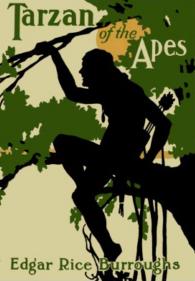
Tarzan of the Apes by Edgar Rice Burroughs (1912)
That was pretty good. A nice descriptive style at least to start with, it might have continued throughout but i just remember being surprised at the start.
The first half has some really nice action. The Jane character is handled fairly well, quite psycological at times and some nice sexual tension.
Yet for all that i still didn't rate it as high as The Cave Girl not sure why, maybe its just a surprise thing, and Burroughs is now a bit too familiar. Although this story is also certainly not without its flaws.
There's some pretty pointless comic relief thrown in the later sections, which feels particularly annoying when one of those characters turns out to be kind of a villain, unintentionally. Its Jar-Jar all over again. Also some of the social aspects later in the book seem more 1812 england as opposed to 1912 american.
There is some choppy editing too, and a bunch of side stories that you have to wade through to explain why various people have suddenly turned up. There must be better ways to introduce people than they show up and then spend 20 pages explaining their presence in pointless flashback.
But i think the main issue might be Supermansyndrome, by about half-way Tarzan has been made so powerful and unstoppable its just really hard to keep any tension in the story.
Possibly one of the more intelligently written of Burrough's tales but not the most fun. Also its best to think of the apes in this as being descendants of ones from those new Planet of the Apes remakes having been transported back in time, because they are pretty much exactly as intelligent as those guys . [3/5]
. [3/5]
The City of Frozen Fire by Vaughan Wilkins (1951)
A 'Treasure Island' ripoff, but instead of an island we land in a lost medieval settlement in south america. A fairly fun adventure story with pirates before the girl from 'Brave' shows up, but she's Welsh not Scottish.
Moments of humour, moments of surprising darkness but overall just a fun adventure story. Its set in 1826 but unfortunately from a social view feels like it was written then, rather than 1950.
While women fair moderately well, the book insists pointlessly on showing that the medieval europeans enslaved the local south americans and never suggests this as anything but a positive. The poor are shown to be little above the slaves and while it very occasionally makes a jab against the romanticizing of medieval life, its nowhere near as acerbic as the likes of a Connecticut Yankee. The overall attitude very much pro-white and pro-rich.
On a sidenote i think the Long-John Silver-esque character is gay, just a thought but it added a little extra.
I probably should deduct a star due to its racism but it has likable characters and is i think still worth a 3, just. [3/5]
Song Items:
Sympathy for the Devil by the Rolling Stones (1968) [4/5]
When They Sound the Last All Clear by Vera Lynn (1941) [4/5]:format(jpeg):mode_rgb():quality(40)/discogs-images/R-3704346-1341049828-5675.jpeg.jpg)
Immortal Love by Eddie Enrico & his Hawaiian Hotshots (2012)
Written and sung by Alan Moore. [4/5]
Home With You by Eddie Enrico & his Hawaiian Hotshots (2012)
Written and sung by Alan Moore. [4/5]0 -
Advertisement
-
New Items:

Amadis of Gaul by Vasco de Lobeira (1508)
A classic tale of knights, damsels and eh... knights and damsels :P . I was going to compare this to a soap until i realised it is, but a very particular kind of soap opera, namely WWE . You see god decides all combats in this universe so the good guy is always guaranteed to win, only magic or traps capable of overruling god. At least on the page, between the pages good knights get beaten all the time, constantly having to be rescued from dungeons or avenged but if it happens on the page you always know who the winner is, apparently god only works with an audience :P .
. You see god decides all combats in this universe so the good guy is always guaranteed to win, only magic or traps capable of overruling god. At least on the page, between the pages good knights get beaten all the time, constantly having to be rescued from dungeons or avenged but if it happens on the page you always know who the winner is, apparently god only works with an audience :P .
Also the combats themselves arn't all that well told, i miss the rhyming. The poetic epics have surprisingly better action sequences, 'Song of Roland', 'Idylls of the King', 'The Faerie Queene' and 'Orlando Furioso' i would all rate higher than this both in action and story. However its still entertaining and with enough variety to keep me interested.
There arn't any kick ass females like in some of the other works i've mentioned but there are a couple i liked, a good female sorceror which makes a change and my favourite the 'Damsel of Denmark' who's almost like an intelligence officer, constantly moving about delivering messages, sorting out problems and gathering intel.
The main characters Amadis and his lady seem a lot like the film version of Aragorn and Arwen. Except Aragorn doesn't burst into tears as much as Amadis (Note, i say film version its not quite the same in the book with Aragorn mostly based on 'Sigurd the Volsung', aka 'Siegfried' from Wagner's ring cycle).
(Note, i say film version its not quite the same in the book with Aragorn mostly based on 'Sigurd the Volsung', aka 'Siegfried' from Wagner's ring cycle).
I preferred his brother Galour who is sneaky when he needs to be and is definitely not a one woman guy unlike weepy Amadis. There are a lot of characters and i couldn't always remember who was related to whom, like other soaps it gets very complicated. Amadis for example has a brother, a foster brother, a half-brother and a female cousin he sometimes calls his sister.
Finally the entire 4th volume, is one long battle and an almost as long ending, its very 'Return of the King' film version, just keeps going :lol .
Still, i really expected to deduct a star from this for length versus entertainment but it actually managed to hold my interest better than expected. Not as good as the poetic epics but decent as long as you don't mind WWE style fight rules .
.
There's a fairly good Librivox version, it uses multiple readers and while most are fine to good occasionally a difficult to parse accent will turn up, but i still found it useful to supplement my reading. [3/5]
Classic Tales of Rupert by Alfred Bestall (1960)
Firstly there are only two stories in this book so while technically correct calling this 'tales' plural, still feels a bit underhanded .
.
Anyway, this is one story from the 50's and one from the 60's. Based on these rupert is a lot more fantastical and weird than i expected . It also uses a strange combination of picture, rhyme and text. They're good but a little bit longer than they need to be. [3/5]
. It also uses a strange combination of picture, rhyme and text. They're good but a little bit longer than they need to be. [3/5]
Facts in the Case of M.Valdemar by Edgar Allan Poe (1845)
Short and somewhat atmospheric tale about hypnotism. [3/5]
Film Items:

Rosemary's Baby (1968)
Good ending and some cool dream sequences but way longer and more tedious than it needed to be. [2/5]
The Rutles, All You Need is Cash (1978)
Mocumentary of the Beatles. Really good until about half-way when you realise they don't have enough ideas and jokes to keep things interesting. [3/5]0 -
New Items:

Oliver Twist by Charles Dickens (1838)
A literary if not literal train wreck.
So i thought i might have problems with this story due to its length, darkness or ubiquity, while not having ever watched a version i still knew the basic plot through cultural osmosis. However i was quite wrong and none of these aspects were problematic, but there were problems.
So this tale is done from a narrator point-of-view, who keeps the story at a distance aswell as undercutting the darker elements with sarcasm and wit. Which is good, because the descriptions of the poorhouse in this could be compared to Auschwitz without any hyperbole.
This is all going splendidly, compelling, funny, moving, easy reading style, nice short chapters. I burned through 30 out of 53 chapters with ease and then... splat!
We get to an event which seems quite similar to something that happened earlier, so already a bit repetitive, but thats not the worst of it. We get this intermission of about 6-7 chapters mostly consisting of walking around in gardens looking at flowers. We also get an entire new cast of characters with their own subplots... we're THIRTY chapters in and it starts introducing all these new people.
But finally it looks like we're getting back to Oliver, i think he gets a couple of lines and thats it... he disappears for almost the next 25 chapters.
You have this almost completed different detective story thing going on instead, its insane. Oh and as for the mystery, wow , twice it does the 'i will now confront the criminal and state to the audience all the facts and who's guilty' cliche and both times it is just awful. Not least of which because half of the facts are completely new to the audience and have never been introduced in the book before this. Thats also putting aside the ridiculous coincidences and Deux Ex Machina's that would make Edgar Rice Burroughs blush :P .
, twice it does the 'i will now confront the criminal and state to the audience all the facts and who's guilty' cliche and both times it is just awful. Not least of which because half of the facts are completely new to the audience and have never been introduced in the book before this. Thats also putting aside the ridiculous coincidences and Deux Ex Machina's that would make Edgar Rice Burroughs blush :P .
Think of two nice looking trains, both have some really nice stuff in their carriages but that does not mean that its going to be a pretty picture when they meet in a head on collision . [2/5]
. [2/5]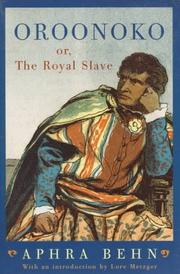
Oroonoko by Aphra Behn (1688)
So its kind of like 'Amistad' mixed with 'Braveheart' . Short tale of an african prince who finds himself on a slave plantation. Reminded me of a shakespearean tragedy at times too. Has the feel of non-fiction in parts, those odd inconsistencies which tend to denote real events.
. Short tale of an african prince who finds himself on a slave plantation. Reminded me of a shakespearean tragedy at times too. Has the feel of non-fiction in parts, those odd inconsistencies which tend to denote real events.
Its narrative structure is unusual in that about half is from the title characters point of view and the rest from the authors.
While i thought it was fine until about half-way i was still expecting to give it 2 stars but it finishes strongly. [3/5]
Hobson's Choice by Harold Brighouse (1915)
A comedy play about 3 daughters who do all the work and their overbearing father who does all the drinking.
This is a pretty solid social comedy, the jokes reminded me of the humour of 'Till Death Do Us Part' or 'All in the Family' if your american. The ending might seem a bit harsh to some of the characters but this is a tough time to live in and 'being nice' is a relative term anyway.
So an easy 3-stars when watched/read in a void... however!
Its also clearly a reimagining of King Lear, and on that basis i gave it an extra star. Personally i always thought Lear himself a bit of an ass and was rooting for the evil daughters most of the time :P . The writer of this play seems of a similar opinion.
I also love the differences shown here between the qualities of a good daughter in shakespears time and a good daughter in 1915. There's a lot you can examine in what the playwright chooses to leave and change between the two works.
I should note nobody else seems to be reading it as King Lear 2.0, so maybe its just me . [4/5] 0
. [4/5] 0 -
New Items:

London, City of Disappearances by Iain Sinclair (2006)
A low 4 stars but still a 4. So Sinclair called up every writer he knows, gave them the subjects 'London' and 'Disappearance' and asked them to send him something.
So this isn't some organized decisive breakdown of london through the ages its a random collection of personal anecdotes, biography, history, poem, short story, essay and other odds and ends. I doubt more than a couple of pieces were written specifically for this collection.
The mix of writing styles is quite cool, although your bound to find one or two you can't stand.
Also if i was an english teacher grading these assignments a lot of people would be getting F's as many have very tenuous connections to the word 'Disappearance' :P.
There is a lot to like here. Literally a LOT, this thing is really long. I have an ebook but a hardcopy might be better, its the sort of book you leave lying around and randomly open and read.
But i do have some gripes, both to do with Sinclair's editing. He's made two attempts to add some sort of structure to this mess.
First he's corralled the pieces into various groupings based on their geographic location in London, not the worst idea. However in effect this has led to a very uneven reading experience as some groups are heavy on fact or fiction, history or biography, long entries or short ones etc.
The other attempt at structure is a piece of ligament called the 'Gazetteer of Disappearances and Deletions' a recurring piece that appears in each grouping. Having some sort of repeating section sounds good. This is made up of short entries mostly by either Sarah Wise, who does what seems to be well researched historical bits or Michael Moorcock who does bull****.
You see Moorcocks entries here are all fiction but presented as fact. Now this might make sense to Sinclair, 'oh look at the thin line between fact and fiction'. But for me this felt insulting to the reader, insulting to Sarah Wise, insulting to history and even insulting to Moorcock. Especially since these entries are not just fictional but are references to other Moorcock stories, making him seem like an underhanded self promoter.
Anyway that was my biggest problem, apart from that its interesting stuff. I mean most of the best parts are biographical or historical and with that sort of stuff its not going to blow your mind or anything best you can say is 'oh that was very interesting' :lol . [4/5]
Burbank with a Baedeker: Bleistein with a Cigar by T.S. Eliot (1920)
Poem about a guy on a venice canal or something. Just as vague and hard to grasp as most poems i hate. [2/5]
To T.S. Eliot by Emanuel Litvinoff (1951)
Poem which is clearly an FU to Eliot. Now that i can get behind . [4/5]
. [4/5]
There Will Come Soft Rains by Ray Bradbury (1950)
Really nice little apocalyptic tale. [4/5]
An Express of the Future by Michel Verne (1895)
Short science dream about a pneumatic tube train. [3/5]
Film Items:


2 episodes of Twin Peaks (1990)
Some of the worst acting and dialogue ever seen on film and yet somehow compelling. [4/5]
2 episodes of The Prisoner (1967)
Interesting concept but doesn't feel like a sustainable idea for a long show run. Also somewhat undermined by the special effects. [3/5]
2 episodes of The Man from U.N.C.L.E. (1964)
Very Bond with the usual 60's sex or is that sexism? [3/5]0 -
New Items:

Melmoth the Wanderer by Charles Maturin (1820)
"..starting from the doze in which he had frequently indulged during this long narrative.
'But hear the result' said the pertinacious narrator."
Well i can certainly see why people might have issues with this book but there's lot of good with the bad. The main plot actually takes up about the first 10%, the 45-60% area and the last 10%. The rest are various other tales which are very tenuously connected.
It opens in ireland and is both very Gothic and very funny, in fact Maturin's sense of humour makes sporadic and odd appearances throughout the book.
After the opening and a short tale to add some more atmosphere we jump into 'The Spaniards' story and this is the low point and longest point of the whole thing. Those two appellations are probably not coincidental .
.
Its a man-vs-institution story and whether its a monastery/convent, mad house, prison, boarding school, police state etc these tales don't have lot of variety to them at least in the broad strokes.
However Maturin is very good at psychology and emotional reactions. Unfortunately this tale is severely undermined by 2 factors. One is that its told by the Spaniard himself, rather eliminating the sense of danger since we know he at least survived, and two its placement.
We know its part of a larger whole and so it takes great focus to stop the 'are we there yet' voice in your head which is waiting for this to intersect the overarching storyline.
The middle section of the book is part of the main plot as i mentioned earlier and this is also one of the most floridly written segments its really good. Then we have two more tales almost back to back.
The 'Gusmans' is a social collapse tale somewhat like Zola's 'the Dram Shop' and 'Elinors' tale or whatever that one was called, is a Gothic romance.
Both of these latter stories are at least a lot shorter than the 'Spaniards' but you might still need to be able to stay in the moment to enjoy them.
Before we finally get back to the main plot for the finish.
Maturins best elements as a writer are his realistic psychology as mentioned before and also his speeches, there are some great speeches by various characters in this. So powerful in fact that Maturin felt the need to add a special disclaimer to say that the opinions expressed by his evil characters where not those of the author .
.
As you can tell it can get very nested, in fact it goes total 'Inception' at times, at one point we have the irish guy listening to the spaniard tell of a story, in which a man is listening to a story about a woman listening to story... how many levels is that :lol . Just hold tight to your totem and lets hope you don't end up in Limbo .
.
I heard once that this was virtually unreadable, glad to say i can disagree. A lot of good parts if not perhaps a great whole. [3/5]
The Swing in the Summerhouse by Jane Langton (1967)
Really very unexpectedly good. I wanted to read the first in the series, especially since its blurb makes it sound like Jumanji , but this was the only one i could find.
, but this was the only one i could find.
Its very much in the vain of E.Nesbit's stories but with some of the surreal darkness of Mary Poppins. However it still stands out as its own thing. Its quite tied to its time and place but that just gives a unique flavour in my opinion.
There are trade off's with the writers style. Its a short and punchy book but that can also mean the characters arn't quite as well developed as some might like, although they still have more personality than many similar characters. Its also very subtle in its lessons but its subtlety might come across as vagueness to others.
The only real issue is a structural one, an element of urgency is introduced but the author isn't ready to deal with it yet so the characters just sort of ignore it.. making them look either foolish or sociopathic depending on your stance :P . Anyway that isn't enough to ruin the story.
Been quite a while since i liked a children's book this much, really nice tone and feel of story. [4/5]0 -
New Items:

Stranger in a Strange Land by Robert A.Heinlein (1961)
"..affect him, if possible with pity and terror . . . or, if not, at least to divert the tedium of his hours with a chuckle or an odd idea."
I grok it but that doesn't mean i have to like it. So this started off as sci-fi, wanders into political satire, with that quick witty (somewhat sexist) dialogue of a Noir, before meandering towards a superhero story with utopian leanings.
I would never recommend this to anyone with an interest in sci-fi. Heinlein has the remarkable ability to take interesting sci-fi concepts and suck the fun out of them. His flying cars and aliens just arn't all that important to the story. Think of it like the 'Futurama' cartoon, science fiction is the aesthetic rather than the content, if you see what i mean. He paints in sci-fi but the picture becomes something else.
Anyway the writing here is pedestrian but not awful and the story is interesting but not exciting. My main physical complaint is that so many chapters involve people just sitting around talking. The conversations being fairly inane discussions of the human condition and taboos. The characters arn't too bad, you may notice some similarities between this and the film 'Charlie Wilson's War' .
.
However this is far more a case of personal taste than professional criticism. I didn't hate it, it did divert the 'tedium of some hours' but i may be removing the other two Heinlein books i had on my to-do list. [3/5]
The Little Prince by Antoine de Saint-Exupéry (1943)
Very reminiscent of 'Everyone's a Aliebn' but not as good. A delightfully melancholy tale. I wouldn't think twice about giving 'Everyone's an Aliebn' to a child but i would hesitate with this.
It just so allegorical and satirical i'm really not sure how much they would get. Pretty good for adults though, it becomes a little too 'Gulliver's Travels' in the middle section and those parts arn't that great but very good start and end. [4/5]
The Duchess of Wiltshire's Diamonds by Guy Newell Boothby (1897)
Short detective tale from the criminals point of view, kind of like Raffles. [3/5]0 -
New Items:

Harry Potter and the Sorcerer's Stone by J.K.Rowling (1997)
Not in the mood for a long review so short version. I wanted to hate it but its actually pretty solid. Takes a lot of inspiration from Tolkien, Dahl and Dickens but is its own thing. Can feel a little episodic at times and author isn't able to come up with enough reasons why the kids don't talk to an adult instead of doing things themselves. But overall its a fairly good and easy read. End of review, now on to the interesting part .
.
I was shocked when i realised what this is. The premise is actually an allegory reimagining white, old money privilege as magic. Its kind of amazing in a horrifying sort of way. Essentially the word muggle is this worlds version of the word pleb and the author uses it with gusto to abuse the non-privileged class even when there are characters from that class around like Hermione. I don't know if Rowling comes from money but it certainly seems like she wants to.
You'll notice there are never any references to what wizards do for a living or what use a Hogwarts education is, because the people who go to these sorts of schools don't actually need to work for a living.
The only reason given for why magic is covered up is that the commoners will all want handouts from the privileged class if they learn how privileged they are.
“Well, their main job is to keep it from the Muggles that there’s still witches an’ wizards up an’ down the country.”
“Why?”
“Why? Blimey, Harry, everyone’d be wantin’ magic solutions to their problems.
It doesn't help that this book is whiter than the private schools its imitating, and in this case that feels like a feature not a bug. Lets not even get into the goblin bankers, i'm surprised she didn't cut out the pretense entirely and call one of them Fagan.
Anyway i am now more interested in reading 'Atlas Shrugged' as i seriously want to compare the two . [4/5]
. [4/5]
Dr. Ox's Experiment by Jules Verne (1872)
Short humorous supervillain tale. Not much more to it than the concept but at least its light and funny. Similar to films like 'Impulse (1984)' or the 'Crazies' but not as extreme.
You know Verne has a lot of supervillains, in his books, apart from 'Dr. Ox' and 'Nemo' we also have 'Robur the Conqueror', and others in 'The Castle of the Carpathians', 'The Begum's Fortune', 'The Underground City' and 'Around the World in Eighty Days'... ok i can't prove that Phileas Fogg is a supervillian but he does have the personality of one (White Rose from Mr.Robot springs to mind) and nobody did find out where his money comes from :P . [3/5]0 -
New Items:

One Hundred Years of Solitude by Gabriel García Márquez (1967)
"Father Nicanor brought a checker set...Jose Arcadio Buendfa would not accept, because according to him he could never understand the sense of a contest in which the two adversaries have agreed upon the rules."
Kind of like Faulkner meets Angela Carter with perhaps some Emile Zola too. History of a Latin-americanish town and told through the eyes of one of its founding families. Magical realism.
A reluctant 4-stars, it sort of wore me down, nuggied me into admitting its good and giving it the extra star. I prefer a more purple prose style and i thought the tone was a little monotonous but both of these seem to improve in the latter half.
Its a lot, it feels really long or perhaps full would be a better description. I got bored quite a few times but everytime i thought it was running out of ideas it would draw me back in. Humourous, magical, confusing, sordid and disturbing. [4/5]
Tibetan Tale of Love and Magic by Alexandra David-Neel (1938)
So first DON'T read the Foreword, it spoils one of the more interesting elements.
This is a supposedly true story told to the author by one of the protagonists. I've marked it as gothic as it has all the elements of a classic star-crossed lovers gothic romance but with an eastern twist. Mysteries of Udolpho meets Lost Horizon... that is an awful analogy even by my standards but you get the drift :lol.
Its relatively short and for a so called true tale it has a nice writing style. It certainly never goes where you might expect and left a pretty good impression. Even though the author might be slightly more fascinating than the story. [3/5]0 -
New Items:

Wistons by Ellen Melicent Cobden (1902)
Wow! that was quite the flourish at the end. This is a really interesting one with very surprising female characters for the time.. or this time frankly.
It feels something like 'Pride and Prejudice' mixed with 'Wuthering Heights'... sortof, not really.
About the first half or even two-thirds feels like a highlight reel. It skips along giving these little episodes of life on this manor farm. The later sections get more and more detailed as our two heroines grow up.
Both of them are very intelligent and bookish. Anyone who reads a lot will know how hard it is to find others of equal introspection . Its all about trying to find a reason to live, your place in the world, other intelligent life.
. Its all about trying to find a reason to live, your place in the world, other intelligent life.
One of the sisters being very empathetic the other self sufficient almost to the point of sociopathy... but i mean that in a good way :lol.
Just a small example of the oddity of the book is that the women sit on the floor a lot. It might seem a trivial detail but its so odd for women of this period not to care about their dresses and just plop themselves down wherever they want .
.
On the downside it does phonetic accent writing on occasion which few writers can pull off. Also some of the writing might be a bit vague, usually during conversations, on occasion i found myself not quite getting what was being said.
By no means the first writer i've had this issue with. Sometimes your just not quite on the same wavelength so even though all the words make sense the meaning can be obscure.
Still not sure how i feel about the main male protagonist, i might hate him but i'm not quite sure i'm meant to :P. I never expected it to go where it does in the end and the whole thing was a very pleasant surprise. [4/5]
Vineland by Thomas Pynchon (1990)
Right... where to start. My first Pynchon. I was actually tempted to give it four stars but part of that was because it fills you with a healthy amount of paranoia against those in power. There is so much outlandish crap spread around these days that i think we begin to overlook all the real conspiracies and corruption out of some sort of mental backlash.
Anyway... the plot such as it is... you remember that episode of the Simpsons where Homers mother turns up who's been on the run since the sixties? Its a bit like that with occasional channel interference from Kill Bill and Godzilla.
About 90% of it is flashback, although they're not so much flashs as bleeds. The transitions from time to time and place to place are quite something as you can never seem to see them until after they've happened.
It can make finding a natural stopping place (their are no chapters) a little hard. You'll be a couple of pages into a new section following new people before you've even figured out that the change happened.
It seems at times stream of consciousness writing with the occasional pool of magical realism. Still not quite sure what a Thanathoid is... i'm thinking ghost zombie nihilist :lol.
Other idiosyncrasies of the author are the various songs thrown in and dream sequences the latter being completely pointless and the former not meaning much to me but perhaps more interesting for those of a musical inclination. About 20% of the book feels like it could have been cut without in anyway effecting the story, and i'm probably being generous with what i consider to be relevant.
There are also two major mysteries in the book, one of why the badguy is doing what he's doing and one about why another character did what she did in the past. Neither of which are really resolved but given the nature of the story i suspected there would be no easy answers so i wasn't too annoyed by that. Also given the type of story i expected it to end with a whimper rather than a bang and was correct on that too, although fadeout instead of whimper might be more accurate.
I like stream of conciousness, 60's-80's america etc. there was a lot i liked here but perhaps too chaotic to love. [3/5]
The Shy Stegosaurus of Cricket Creek by Evelyn Lampman (1955)
A decent enough kids story about attempts to save an inherited dirt farm with the help of a neighbourly talking dinosaur. Not the most cheerful thing in the world and the last part is a bit sudden and flat. Then again i was never the biggest fan of the Hulk tv series or Littlest Hobo. [3/5]0 -
New Items:

Swiss Family Robinson by Johann David Wyss (1812)
Pretty much what you might expect. A mother, father and four sons shipwrecked on what they claim is an island although no one ever bothers to circumnavigate it so we'll never know for sure .
.
Its quite Vernian, in that it spends a lot of time giving mildly interesting and often incorrect information on plants and animals. Usually involving how best to kill them .
.
I did like the unintentional irony. Sometimes the father would get worried at how callous the sons are getting while praising there killing powers the rest of them time. At one point someone asks why god would created something as vicious as a wild cat, he says while holding up the cat which he just killed . There are also some sights you can't unpicture, a small child clubbing penguins to death is the sort of thing that will stay with you.
. There are also some sights you can't unpicture, a small child clubbing penguins to death is the sort of thing that will stay with you.
Anyway there just isn't enough here to separate it from the hundreds of other shipwreck stories so i deducted a star... then i put the star back because of the humour.
There's some genuine warm family teasing here and the parents in particular can be quite sarcastic. However in the end i took the star off once more because of the geography.
Sorry but if you have a hippo, kangaroo and capybara in the same small piece of land something has gone horribly wrong, or your at the zoo :lol . [2/5]
Satan Wants Me by Robert Irwin (1999)
In 1967 a sociology student and acidhead gets involved with a satanic cult. Very much a love letter to the 60's and 60's occultism. If names like Crowley, Wheatley or films like Rosemary's Baby, don't mean anything to you, your probably not going to get the most out of this. Actually maybe some Kerouac, William S.Burroughs etc. wouldn't hurt either.
Some knowledge of 60's music (which i don't have) would also help. This book should really come with a playlist.
The whole thing is done as diary entries which can be a bit limiting. Still, i thought it would be an easy 4 stars, however it starts to come apart around the 3/4 mark. People change personality too abruptly, there's a big information dump at one point and some 'Story of O' type stuff which didn't do anything for me.
However it manages to pull itself together and keep the 4th star, if only just.
I don't think the story takes itself too seriously either, which is a good choice, there's a twinkle in the eye which keeps it from being too, pretentious? for want of a better term.
At times funny, interesting, sexy, disturbing, creepy and vile, but rarely boring. [4/5]
Film Items:

Danger: Diabolik (1968)
Crime thriller done by some of the same people as Barbarella... you can tell. Its fine but not much more. The most interesting thing about it is that one scene seems to have been stolen for the original Point Break film . [3/5]
. [3/5]
Sunset Boulevard (1950)
Some good elements mostly in the small details and turn of plot. The main performance is so over the top it didn't relly work for me. Although its contrast with everyone elses normal acting was kind of interesting. [3/5]0 -
New Items:

The Trials of Persiles and Sigismunda by Miguel de Cervantes (1617)
So this is a love story supposedly, with innumerable sup-plots. Every time a new character shows up we get yet another tangent. Whats odd is that not only do the actual characters get bored with some of the sub-stories but the author apologises to the reader at least ten times about how repetitive it can get.. and then continues on in the same way as before .
.
Most of the plots involve someone being forced into a marriage they don't want. The people who can't take no for an answer being both men and women but mostly men of course. This leads to one of the ironic highlights because the main love tale when you finally learn all the facts isn't exactly Romeo and Juliette thats all i'll say .
.
The main plot starts in the middle and is filled out bit by bit in flashback which is a good technique i felt.
Other items in the plus column are that the sub-plots or episodes in the main plot are all very short. So if you don't like something don't worry it won't be there for long. The story is also quite random or at least unpredictable in its turns, which i generally consider a good thing.
The best thing about the book however is its world building, which bares about as much relation to real history or geography as that of Robert E.Howards stories do .
.
A low 3 stars, its a mess, but enjoyable enough. [3/5]
Now We Are Six by A.A.Milne (1927)
As 1920's poetry collections for children go, this is fairly decent... i kind of thought it was a winnie-the-pooh book but.. whatever.
Technically Pooh is in this but its barely a cameo. I'm not a fan of poetry either, or i guess because this is for kids we may have to call it nursery rhyme? Anyway its.... fine. [3/5]
Polpelly Christmas by Frank Richards (1936), The Magnet issues #1452-1455.
Its good, i was tempted to give it 4 stars at some points. Adventure, humour, secret passages, mystery, danger, racism, the gangs all here :P . For some reason the main badguys keep getting called dagoes, even though they're italian, don't you just hate it when people use the wrong racial epitaph .
.
Bunter does his best Scooby impression blundering in and spoiling enemy plans by accident, but they also manage to get him out of the story for a while which is good as too much Bunter can get pretty annoying.
Some decent characterization of the other characters too. In fact one of them goes dark, like Nolan's batman dark... but luckily avoids Snyder's batman dark.. nobody needs that .
.
Its a bit episodic which would make sense, issue to issue but here it happens chapter to chapter even though the chapters are published together. Not much point in a cliffhanger when the continuation is literally right next to it.
Glad i read the original magazines as one of them included the delightful (this is sarcasm) section, the 'Greyfriars N*GG*R Review' (it gets worse) which is a set of instructions on how kids can perform their own Black and White Minstrel show for christmas, fun for the whole family (not) :lol . [3/5]
Film Item: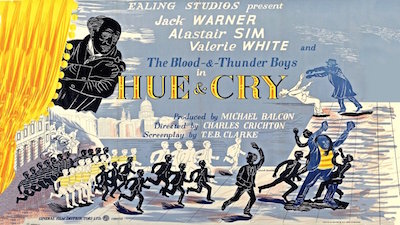
Hue and Cry (1947)
Pretty good kids vs criminals adventure. Let down by a couple of bad edits and lack of a reward scene at the end. [3/5]0 -
Advertisement
-
New Items:

The Purple Cloud by M.P.Shiel (1901)
"...savagery civilised in its top-story only: for civilization was apparently from the head downwards, and never once grew below the neck..."
So the author is a monster but on the upside so are his characters (and he's been dead for 70 years, bonus).
Apocalyptic fiction. The psychology of it reminded me a lot of Robinson Crusoe. Oh yeah in case you havn't read that, Crusoe is pretty deranged... but the poster child for sanity compared to this protagonist. Who i would describe as a paranoid schizophrenic pyromaniac with delusions of grandeur .
.
I've read two other works by this author but don't recall either of them being this hard to parse. Some quite difficult to decipher sentences at times, heres an example, if you hate comma's look away now :
:
"I leaned and loitered a long time on the bridge, gazing up to the craggy height, which is heavy with a waving wood, and crowned by the Castle-tower, the Tees sweeping round the mountain-base, smooth here and sunlit, but a mile down, where i wished to go, but would not, brawling bedraggled and lacerated, like a sweet strumpet, all shallow among rocks under reaches of shadow - the shadow of Rokeby Woods."
What does the last part of that even mean, did that cliff murder a hooker? :lol .
Its about 15-20% longer than it needs to be. There are also some very dry spots usually when the author is describing things and the ending while probably very meaningful on a personal level does feel fairly pointless in the grand scheme of things. So some may feel it to be anti-climactic.
Its also very religious which i say as a neutral statement, its this really odd mix of old victorian ideas and newer 20th century science. Overall a bizarre and highly interesting bit of fiction with a unique anti-hero.
Plus an interesting representative of the clash of new and old ideas from the turn of the century when it was written.
Also if it makes you feel better about reading something by this author at least he did time, thats more than has happened to most of our monster contemporary or historical. [4/5]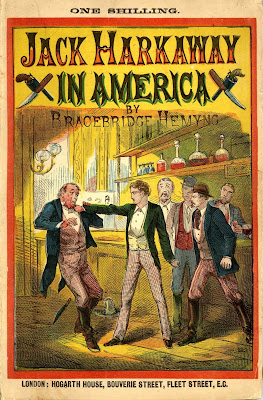
Jack Harkaway in New York by Bracebridge Hemyng (1879)
Incredibly cliche and yet still compelling at times. You have our perfect hero, great at everything, the love interest and the rival. An the evil english lord with his even more evil foreign servant. Also a couple of comedy relief chapters and various silly coincidences.
Yet i still nearly gave it 3 stars, mostly due to its unusual structure. It actually tells the story from multiple points of view and we even get a fair bit of time with the villains.
Its also a very easy read, the 19th century equivalent to airport literature. [2/5]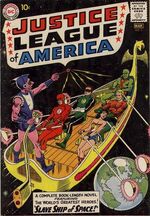 ____
____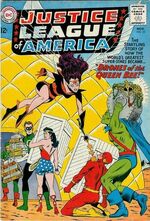
Justice League of America #03 (1961) [3/5]
Justice League of America #23 (1963) [3/5]
Two fairly similar comics. Both find decent ways to use the heros powers but no one has anything in the way of a personality.
Film Item: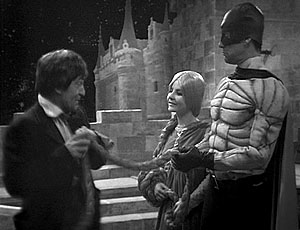
Doctor Who, The Mind Robber (1968)
5 episode storyline. Really good tale, nice and weird. Little bit confused at the end but stands up remarkably well overall. [4/5]0 -
New Items:
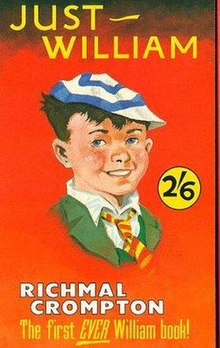
Just Willam by Richmal Crompton (1922)
First off in the version i read there seemed to be a chapter out of order, i would read the chapter titled 'Jumble' after 'The Show' for maximum making sense .
.
There's nothing new under the sun. In terms of old english characters while Billy Bunter is distinctly Eric Cartman, William Brown is very much Bart Simpson, (maybe a a tiny bit less evil though).
Its episodic fare nothing in the way of overarching story but the humour really doesn't age, its good stuff. Not much else to say really, a little bit more personality for his brother and sister might have been nice but otherwise just solid ageless annoying child tales. [4/5]
The First Settlement of the Cessares by James Burgh (1764)
Straight forward utopian plan, not a lot in the way of story. Despite the name this is about a dutch colony hidden in south america.
Presented through a series of letters which describe the laws, history etc. of the colony. Its a purely puritan/omish system, cromwell would be proud, the main town is even called Salem.
Its main utopian idea is that everyone gets an equal sized piece of land (with some variation depending on soil quality). There doesn't seem to be any trade, each family live off their own land.
While its ideology is extreme it is at least not too hypocritical. The author uses a lot of references to backup his ideas and also takes potshots, at wars, slavery, the genocide of the south americans by the spainish, the distribution of alcohol to the native americans etc.
Slighty more interesting than More's 'Utopia', Bacon's 'The New Atlantis' or 'The Commonwealth of Oceana' at least. [2/5]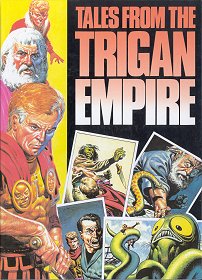
Victory for the Trigans (1965)
Compiled from 19 issues of The Ranger comic. History tale of romanish aliens but with jetpacks and rayguns. Its fine but some logic issues, and a bit too allegorical for my taste. [3/5]0 -
New Items:
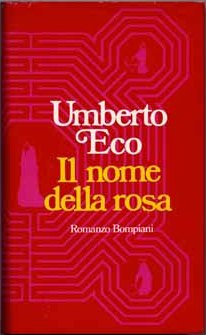
The Name of the Rose by Umberto Eco (1980)
I still prefer 'Island of the Day Before' despite giving it a lower score . Eco's writing here is beautiful albeit prolix. He likes to show his work, so if he's discovered some name or item it will be listed, even if it takes him half a page
. Eco's writing here is beautiful albeit prolix. He likes to show his work, so if he's discovered some name or item it will be listed, even if it takes him half a page  .
.
Also there's quite a bit of untranslated Latin which was just annoying.
I'm really not a fan of detective novels and Sherlock Holmes in particular, and this is very much a Holmes story... if he lived in the middle-ages.. and used to be an inquisitor :P .
However there is also a lot of politic and historical backdrop which makes the tale more compelling than a standard murder mystery.
You'll probably find it hard to follow all the politics and various factions but that is actually part of plot, with most of the characters finding it hard to figure out which side people are on and who believes what.
Eco is a master at capturing the medieval mind, and how they viewed things differently from today. Even our main detective who has a pretty advance viewpoint in general is still limited in some of his views by the times.
Its just a very solid story with well crafted characters a good 4 stars throughout... except for the ending, thats where it got the extra star.
When the final mystery is revealed it almost feels like a let down.. until you get the explanation... which is so interesting, so apt for the world today and just really left me pondering heavily . [5/5]
. [5/5]
The Adventures of King Pausole by Pierre Louÿs (1901)
My score on this one has not been effected by any moral judgments. If it was it would be about minus 20 stars . But i'm just going to put aside the questionable age of some of the characters and the authors complete certainty that women always mean Yes when they say No. It is or at last claims to be humour and if this was written by Rabelais in the 17th century i might be looking at it differently but 1901 is a bit too late to be this primitive.
. But i'm just going to put aside the questionable age of some of the characters and the authors complete certainty that women always mean Yes when they say No. It is or at last claims to be humour and if this was written by Rabelais in the 17th century i might be looking at it differently but 1901 is a bit too late to be this primitive.
This is a philosophical sexual comedy about a small kingdom where the only law is don't hurt anyone, apart from that you can do what you like especially when it comes to sex. Oh except for the royal family of course, where the king imposes his own set of rules, because this book can be quite realistic at times .
.
Despite its caveman ethics in places, its also quite advanced in others, there are gay characters and its belief in sexual freedoms is quite modern.
Its also genuinely funny at times. Its also quite confused, contradictory and meandering. An interesting satire on sexual ethics and very bold for the time period but no classic.
Of note i own 'The Bumper B3ta Book of Sick Jokes, so bad non-pc humour is fine by me, however in this case it kept catching me off guard and you could never be sure how much of a joke was intended. [3/5]0 -
New Items:
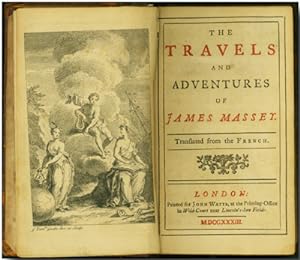
The Adventures of James Massey by Simon Tyssot De Patot (1710)
A fairly dry travel story with the usual assortment of shipwrecks, savages, slavery etc. The middle third is set in a lost kingdom which i guess you could call utopian but its little different from the real world.
Perhaps a little more orderly but only in the way ancient china could be considered orderly. They still have bloodsports, multiple wives and a king. But no deathpenalty, just hard labour for life... is that supposed to be better? , they also don't pray or believe in an afterlife although they do worship.
The adventure elements are interrupted by frequent scientific and religious discussions, on why we have calendars, gravity, how we know the sun is big and that the earth revolves not the stars etc. Some of the physics stuff is quite hard to follow in 18th century language... although i might have a hard time with it even in modern speech .
.
The main elements of the book however definitely seems to be the religious arguments. The author not wanting to be burned alive, has the protagonist usually take up a very pro religious stance defending even the stuff which contradicts all the other stuff.
However he then has other characters use logic and reason to attack dogmas and religious minutiae.
The whole thing is an odd assortment of bits and pieces but it held my attention well enough. [3/5]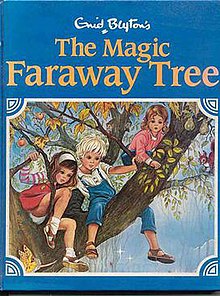
The Magic Faraway Tree by Enid Blyton (1943)
At least i didn't want to chew my arms off from boredom like the "Wishing Chair" stories.
I maintain that Blyton is by every measure a terrible writer. She has a decent amount of imagination but its mostly of the 'Alice in Wonderland' variety, ie only interesting because its so random.
I suspect a lot of the joy people find in her books is due to her psycological attacks on the reader. The characters and narrator are constantly telling you how 'exciting', 'delightful' or 'fun' the adventures are. I guess if you tell people something often enough they will start to believe it .
.
Anyway i didn't hate this it was fun enough for what it was. Its the childrens book equivalent of a slocky B-Movie and i have been watching a lot of MST3K lately, so who am i to judge . [3/5]
. [3/5]
The Jungle Book: Mowgli's Story by Rudyard Kipling (1894)
I was reading the illustrated Jungle Book available on gutenberg but gave up when i got to the end of the Mowgli stories.
Its fine, pretty much what you might expect. Its knockoff Tarzan is actually much better despite Burroughs inferior writing abilities. [3/5]0 -
New Items:
Black Mischief by Evelyn Waugh (1932)
'...constitutional monarchy, bicameral legislature, proportional representation, women's suffrage, independent judicature, freedom of the press, referendums...
What is all that? asked the Emperor.
Just a few ideas that have ceased to be modern.'
That was fairly fun. A satire about a small nation of complicated culture and history, with a new leader who wants to reaplace the savagery of barbarism with the savagery of civilization..
I tend to quite like these small country political stories and have read quite a few but this stuff tends to be a backdrop to the main plot.
These elements arn't used here as the setting for the magical realism of 'One Hundred Years of Solitude', or the hippie utopianism of huxley's 'Island', nor the personal dramas of 'South Wind' or 'Palace Without Chairs'.
There isn't really even anything you could call main characters. It reads at times more like a moviescript than a novel. There is no greater plot, its just this sketch of the life of the island through the eyes of various random elements.
Nevertheless its well drawn and quite funny and easy to read. Also occasionally quite dark at times especially near the end.
Oh, its also quite un-PC, but not in an aggressive way... although i am an extremely white male so your feelings may vary .
.
Overall a nicely drawn albeit somewhat shallow satire. [3/5]
Lady Pokingham by Anonymous (1880)
'...evidenced by the large bunch of keys you always seem to have in your pocket..'
While not as funny as i had hoped given the opening, that was actually much better than expected. Of course my expectations were rock bottom but still .
.
The story is told from the point of view of a woman dying from TB at the tender age of 23, which setup tends to mitigate the harsher elements of the story somewhat.
It tries to keep up the variety and avoid being repetitive. Covering pretty much the entire sexual rainbow, and since this is victorian there is the usual spanking fetish but not as prevalent here as some other works.
There's also a few story elements such as secret societies but the plot is minimal. Overall enjoyed it or perhaps more accurately, tolerated it quite well.
Sidebar, the victorians were also a little more advanced than i expected
'The godemiches.. made of the finest vulcanized india rubber.. we strapped them on as soon as they were charged with a creamy compound of gelatine and milk.' [3/5]
Paul Bunyan tales (1916)
In these short folk tales Paul is basically the Chuck Norris of his day . [3/5] 0
. [3/5] 0 -
New Items:

When the World Shook by H.Rider Haggard (1919)
'..think not that you Westerners have done with wars.. and what the sword spares class shall snatch from class in the struggle for supremacy and ease.'
Quite a lot of good moments in this sci-fi adventure story. Also probably one of Haggards smoothest reads. I imagine he had a few more passes on the draft than he usually does.
Most of the good elements are character driven. The plot moves slowly and is not helped by all the foreshadowing. Its pretty obvious where things are going even if you havn't read any other Haggard stories. If you have read some of his other books however then a lot of this will feel very familiar.
Given its publishing in 1919 you might expect some influence from the war but despite the storyline lending itself well to that Haggard seems to almost resent having to acknowledge the conflict. The story is also quite religious, in fact the most religious adventure story i've read since 'Ardistan and Djinnistan'.
Its almost a perfect representation of its time period. A bit more advanced than the victorian novels but oddly old fashioned for a modern work. Although i've said its slow, the downtime for want of a better term, is not without its charm mostly due to the personalities of its characters. Theres a fair bit of humour here. [3/5]
Hound of the Baskervilles by Arthur Conan Doyle (1902)
Yeah its pretty good, there were times when it was 4 stars but dropped a bit in the latter stages.
I thought i'd like this better than the short Holmes stories as a lot of those tend to lack much characterization. It started off strong but when your 2/3's of the way through you realise not much has really happened. I mean until near the end the only proof of a crime is the fact that this is a detective story :P .
It doesn't help that the characters keep telling you that they're facing some sort of supercriminal. This isn't Moriarty or 'Fantômas' or something. Also its hard not to guess a few of the details due to the cultural absorption of the tale.
Listened to an excellent reading by 'David Clarke' on LibriVox. [3/5]0 -
New Items:
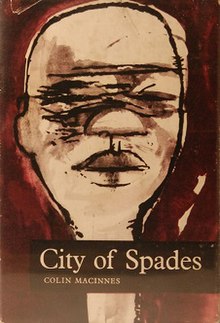
City of Spades by Colin Macinnes (1957)
That was fairly good. It starts off well, told from the point of view of two main characters, a nigerian student in london for a year of study and a newly appointed colonial welfare officer.
The coloured community of 1950s london is a pretty unique setting. As well as nigerians you have gambians, people from trinidad and other caribbean islands, and a number of americans usually visitors, GIs or showbiz types.
However after the initial setup things become a bit episodic or sporadic might be a better descriptor. With its variety of characters it reminds me a lot of Evelyn Waugh, except not funny, then again i don't usually find his stuff all that funny either :P .
Like Waughs novels, by the end there arn't really any likable characters or over-arcing plot, its more just a series of incidents.
The main nigerian character probably comes off the worst until you remember he's 18, which pretty conclusively explains if not entirely excuses his actions .
.
The book is about race but not really racism. Its surprisingly light on the racism for 1950s but mostly because there are only a few white characters and they're mostly of the very liberal type.
By the end the whole thing just feels a bit slight. Fun and interesting enough but a bit thin. [3/5]
Birds of Paradise by Paul Scott (1962)
"..I've been trying to tell the truth about people as I thought they were and about myself as I thought I was."
Well that was existentially depressing, and not in an awesome way like the 'Tartar Steppe' or something.
Its also really hard work, even the good parts. The author has a very purple verbose style, which i normally like. It works well in describing scenes but a lot of it is simply about thinking. He can spend endless paragraphs analysing why people act the way they do and rarely comes up with an answer or even an interesting question.
A lot of the scenes are half remembered events, and while the inexactness of memories is very realistic and maybe even important to this particular story, that does not make it any less frustrating for the reader.
Its mostly a biography and the early portions in a (i'm guessing) somewhat fictionalised India are pretty good although not as magical as some other india related books i've read.
The 2nd quarter is the worse part, a turgid mess of the characters life until middle-age, it takes real concentration to stop your eyes glazing over.
Finally though we get back to something which lends itself better to the writers overdone style, which are events during and after WWII. These parts are really good, even the psychological analysis parts work well, for the first and last time in the story.
The whole thing finishes with a whimper rather than a bang, which in this case may actually be what the author intended. Only towards the end does it become apparent that the whole tale has been about the pointlessness of life, or most lives.
Hard graft, only recommended for readers who like to really earn their enjoyment of a book . [3/5]
. [3/5]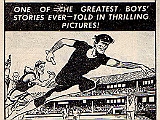
The Truth About Wilson (1964)
Comic version of a character created in 1943. Wilson is a super athlete perfect in every sport, he lives in the woods on nuts and berries. The best aspect of the stories are the occasional hints of something weird about the character. [4/5]0 -
New Items:

Back from the Dead by Chris Petit (1999)
Detective thriller about a rockstar receiving stalker letters. Really good, its a bit weird that the investigation stuff actually tends to come as a relief, because the personal lives of the characters are somehow more disturbing .
.
The author can do a lot with a little, very short chapters. A lot of deadends or things which technically arn't connected to the main mystery but it all adds to the atmosphere and sense of realism, life is never neat .
.
I could never quite settle with this one, everything was just a little off. Changes of character perspective, changes in tone, it kept me constantly offbalance, which while not a pleasant feeling is probably what you would want from something like this .
.
Some knowledge of the Manson murders, the Rosemary's Baby film, and the death of John Lennon might all be useful. [4/5]
The Yawning Heights by Alexander Zinoviev (1976)
"Their aim is to distort judgements and divert public attention to trivia. And this does not merely affect cultural life. It affects every important aspect of life. Have you seen today's Newpaper?"
A massive tome of anti-communist satire with an annoying, perhaps even horrifying, amount of relevance today. I thought it might be smaller on the inside as it had a decent sized font and margins but its actually bigger on the inside.
Made up of small chunks of genuine sociology, little scenes of life and a ton of satire. Most pieces are only a page or two with maybe some extensions to 4 or 5 pages towards the end.
If i arbitrarily divide it in 4, the first quarter is the funniest and lightest. A perfect blend of high and low-brow humour mostly revolving around the building of a latrine.
The second quarter is the hardest, a lot of heavy sociology although most is given a dumbed down explanation or examples aswell.
The third part feels the most personal. It made me wonder who the people behind the satire really were and made me miss the fact that i know so little about soviet russia.
The last quarter is the darkest. Dealing with the most brutal aspects of communism aswell as projecting into a future where the great Ism has taken over the world, hence my putting it on my dystopia shelf.
Having divided it in 4 let me go back and say that those are only the broad outlines and theres a constant intermixing of comic sketches and deep thoughts.
Reminded me of Dilbert :lol, with its incompetent leadership and frustrating bureaucracy in which talent is stifled and stupidity rewarded. Dilbert, if your boss could also have you killed .
.
Its a LOT and really depressing , but i'm still giving it 4 stars, which is worth a lot more than 4 stars spread over 250 pages :P .
, but i'm still giving it 4 stars, which is worth a lot more than 4 stars spread over 250 pages :P .
"What fantasies, what myths define
The dreams that sooth my brow?...
...The scientist who's in control?
...The footballer who scores a goal?
Must we on them rely?
Alas, there is no other choice.
The fairy tale has died,
Their heroes vanished, stilled their voice,
There's nothing left beside." [4/5]
14 issues of Iron Fish (1967)
Good comicstrip adventures usually lasting 2 issues, which is 4 pages. The Iron Fish design is iconic. [4/5]
2 issues of Mr. Apollo (1953)
Super-man knockoff comic. One fairly bland story, the other delightfully absurd. [3/5]
18 issues of the Adventures of Tommy Walls (1953)
Single page comicstrips so this represents two story arcs. An advertising character for Walls icecream. The LoEG claims he's powered by ice-cream, which made him sound like Bananaman or Pop-Eye. However these are typical boys-vs-crooks stories and any goodluck or bright ideas attributed to the ice-cream are specious. [3/5]
1 issue of the Adventures of Mark Tyme (1967)
Comic about inventor and judo black-belt lost in time. Its passable. [3/5]
Film Items: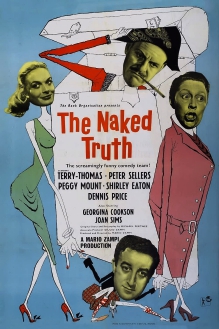


The Naked Truth (1957)
Comedy about a tabloid reporter who blackmails the rich & famous and the various murder plots that ensue. Pretty good, does tend to rush to the finish though. [3/5]
Gorgo (1961)
Grading on a curve here but its pretty good for what it is. A lot of Kaiju cliches although it might be inventing some of them. The special effects are decent for the genre and you get to see a few london landmarks destroyed. [4/5]
2 episodes of Captain Scarlet and the Mysterons (1967)
A bit too grown up for most people who like puppets. But for a niche audience i'm sure it must have been amazing. [4/5]0 -
New Items:
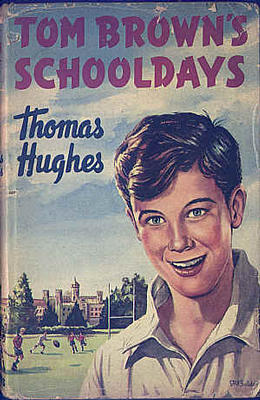
Tom Brown's Schooldays by Thomas Hughes (1857)
This starts well enough, a love letter to old england. Its view of early 1800's schools being pretty unique. The story has a fair bit to say about bullying which i found surprising, when you have in Dickens kids being beaten and starved to death i wouldn't have thought anything as smalltime as bullying would register with the victorians .
.
Some of the slang and other word usage can be a little difficult at times. Our protagonist is also a little too tough to completely sympathize with. You expect someone a little weaker for a coming of age tale like this. The narrator can also be a bit of a problem as you always feel his presence and that adds more distance between reader and characters.
But its still not bad and at the half-way point looks like improving. The introduction of a weaker character seems as if its correcting one of the issues i pointed out.
However thats when it all starts to fall apart. The book devolves into an insipid mess, actually reminded me of 'What Katy Did', not the sort of company any book should want to be in .
.
Its also far too sporadic and makes too many time leaps preventing any potential connection to the characters.
At its best its ok, but for parts of the second half its far from its best.
Listened to some of it on a good Librivox recording. [2/5]
Jack Wright and His Deep Sea Monitor by Noname (1901)
Short dime novel. Very basic writing, trys to make up for it by having virtually every chapter end in a cliffhanger. Also throws in a lot of different elements, savages, technology, pirates, sea monsters, comedy sidekicks, funny accents etc. Very meandering and random though. [3/5]
Scanners Live in Vain by Cordwainer Smith (1950)
Short story with a really nice mix of high-brow and low-brow sci-fi. Very good world building too. [4/5]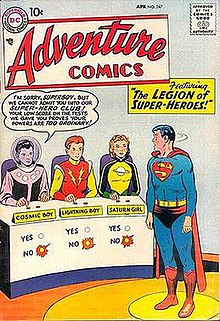

4 issues of Roy of the Rovers (1979)
Pretty well written comicstrip. If you like football drama's, which i don't . [3/5]
. [3/5]
Adventure Comics #247 & #267 (1958)
First appearances of the Legion of Super-Heros. I like it, they're always kind of evil, even though their the good guys. [4/5]
Brave and the Bold #28 (1960)
First appearance of the JLA. Kind of ran out of steam at the end but not bad. [3/5]0 -
Advertisement
-
New Items:

Worrals of the W.A.A.F by W.E.Johns (1941)
Its possible my low expectations have resulted in this high mark but i'm not sure. Its a very solid spy-thriller. With a few touches of women vs male authority. I actually would have preferred if Worrals was a little older as being 18 lends an extra YA element to proceedings too, which was unnecessary.
These kind of spy adventures can be very convoluted and messy like the awful 'Thirty-Nine Steps'. But this one is very solid and logical. Even when things go wrong, its never because of bad decisions, or at least not because of stupid decisions.
Its fast paced and short tale with very likable characters. There is one bit near the end where i felt it introduced too many new elements and we had a bit of an information dump but it did lead to some nice dramatic scenes.
Far better than the one biggles book i read as a kid . [4/5]
. [4/5]
The Wouldbegoods by E.Nesbit (1901)
One of her non-magical tales, a sequel to the 'Treasue Seekers' which i havn't read. The narration was quite confusing at first, apparently in the previous book its explained that the narrator is supposed to be a mystery.
A group of children are sent to the country and decide to try being extra good as they're always getting into trouble. Leading to the kind of chaos you would expect. By the half-way point my inner adult was getting quite annoyed but the author seemed to sense this too and the kids are less destructive in the second half.
Its well written but almost feels like a script at times, like it would work better as a film than it does on the page, bit hard to explain. I alternated between listening on Librivox and reading it and i think it was more designed to be listened too.
The Librivox recording is also done randomly by a man and woman, possibly due to the narrator mystery but it works well. [3/5]
16 issues of Li'l Abner (1941)
Comicstrip, kind of like the Beverly Hillbillies but without the beverly part . [3/5]
. [3/5]
A Voyage to Great Garaband by Henri Michaux (1936)
Short bits of surrealism, probably satirical like Gullivers Travels. Some of it can be interesting but only in the way a Rorshach test is. [2/5]
The Count's Beard by Italo Calvino (1956)
Short folktale with bits of poetry. Sort of humourous with a detective element. [3/5]0
Advertisement



